Charles Jackson’s left-hand penmanship
27 May 2024
Charles Jackson, a Private in the 8th Connecticut Infantry was not quite 18 years old when he was shot through the right wrist at Antietam on 17 September 1862 and captured there at the farthest advance of the Union Ninth Corps that day, nearly to the town of Sharpsburg.
The next day his hand was amputated at the forearm, probably by a Confederate surgeon. Two days later, left behind near the battlefield when the Confederate Army retired to Virginia, he was “recaptured” and put in the care of his own Army. He was sent home in February 1863 but returned that fall and served two more years, in the Veteran Reserve Corps, to October 1865.
Which is probably when he saw an announcement like this one:
On Christmas Day 1865 he wrote the organizer of the event, the Rev. W. Oland Bourne, describing his war experience, his wounding at Antietam, and his life at that moment and enclosing a sample of his best handwriting as his entry in the contest. He was the 221st of some 270 men to enter.
He did not win any prizes, but certainly made a respectable showing.
Just 21 years old at the time of the contest, Charles went on to a long and fruitful life, and was a letter carrier in Hartford for almost 50 years.
Notes
See much more about the penmanship contest and it’s sponsor, William Oland Bourne, in an exhaustive exhibit at the Library of Congress, source of the photograph and documents here; transcriptions below.
At least 13 other amputee survivors of the Maryland Campaign of 1862 also entered the 1865-66 contest (Series 1) or the one that followed in 1867 (Series 2); viz:
Capt. Charles A. Edmonds, Co. H, 7th Michigan Infantry, South Mountain, MD (9/14/1862); Ser. 1, #51 …
Lewis H. Roth, Co. E, 12th Pennsylvania Reserves, South Mountain, MD (9/14/1862); Ser. 1, #171 & Ser. 2, #89
William A. Till, Co. A, 23rd Ohio Infantry, South Mountain, MD (9/14/1862); Ser. I, # 17
Sgt. George H. Tyler, Co. I, 23rd Ohio Infantry, South Mountain (9/14/1862); Ser. I, #58
Alva John Williams, Co. B, 22nd New York Infantry, South Mountain, MD (9/14/1862); Ser. 1, #217
Ira D. Brougher, 130th Pennsylvania Infantry, Antietam, MD (9/17/1862); Ser. 2, #113
Capt. Francis X. Burger, Co. E, 4th Pennsylvania Reserves, Antietam, MD (9/17/1862); Ser. 2, #101
Lt. Samuel J. Cloyd, Co. I, 12th Pennsylvania Reserves, Antietam, MD (9/17/1862); Ser. I, #170 & Ser. 2, #85
Frederick R. Cutler, Co. K, 72nd Pennsylvania Infantry, Antietam, MD (9/17/1862); Ser. I, #241
Corp. James H. Kneeland, Co. D, 15th Massachusetts Infantry, Antietam, MD (9/17/1862); Ser. 2, #90
James O. Ladd, Co. I, 15th Massachusetts Infantry, Antietam, MD (9/17/1862); Ser. 1, #218
William B. Livermore, Co. F, 89th New York Infantry, Antietam, MD (9/17/1862); Ser. 1, #59
Corp. George J. McKenny, Co. B, 128th Pennsylvania Infantry, Antietam, MD (9/17/1862); Ser. 2, #104
______________
Transcriptions for Jackson’s letter and writing sample, thanks to years of crowd-source volunteers’ work:
[pg. 1]
Willimantic, Ct.
Wm Oland Bourne Dec 25th 1865
Sir
The paper you sent, The Soldiers Friend, is received, for which I am very thankful. The premium offered to the left armed soldiers is a great inducement for them to learn to write. I have often thought I would not write to compete for the premium, as I was almost ashamed to show my writing in public. I have had a plenty of time to practice since I lost my arm, but (unfortunately) have not improved my time as I ought. However I have resolved to try and do the best I can for the short space of time which I now have. I dont think mine will look very conspicuously bad among so many. It is now almost eleven o clock P.M. and it cannot be expected that my nerves will be very steady after working all day. I will now show you the hand I write at the rate of a page in five minutes.
I enlisted at Hartford Connecticut on the twenty first day of September A.D. one thousand eight hundred and sixty one. to serve three years. (I was enroled a Private), I participated
(Co D, 8th Conn. Vols.) W.O.B.
[pg. 2]
in the following battles. Roanoke Island, Newburn, Fort Macon, South Mountain, and Antietam. at the latter place I was wounded with an Minnie ball. the ball passing through my hand and, I was going to say, rendering amputation necessary, but no! it might have been saved if I could have had it taken care of, but alas! I was taken prisoner. I was wounded on the seventeenth Sept. taken prisoner on the field had my arm amputated on the 18th, was paroled on the 19th and recaptured on the 20th.
I remained in hospital about five months and received my discharge and returned home. Soon after I arrived home I obtained employment in a thread factory. – this is written quicker still – I enlisted in the Veteran Reserve Corps. on the 27th of October 1863 to serve three years. was discharged at New Haven Oct 12th 1865. Soon after coming home I obtained employment at a cotton factory, where I am still working. If I had plenty of time I could write more and better.
Yours Truly
Charles Jackson
Willimantic
Conn
Antietam, Sept. 17, 1864
W.O.B.
___________
No work is the hardest work.
Ho! ye who at the anvil toil.
And strike the sounding blow,
Where from the burning iron’s breast
The sparks fly to and fro:
While answering to the hammer’s ring.
And fires intenser glow,
Oh! while ye feel ’tis hard to toil
And sweat the long day through.
Remember it is harder still
To have no work to do.
Ho! all who labor, all who strive,
Ye wield a lofty power;
Do with your might, do with your strength,
Fill every golden hour:
The glorious privilege to do
Is man’s most noble dower.
Oh! to your birthright and yourselves,
To your own souls be true;
A weary wretched life is theirs
Who have no work to do.
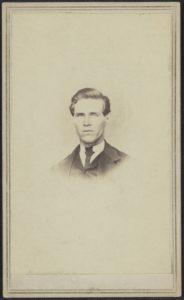
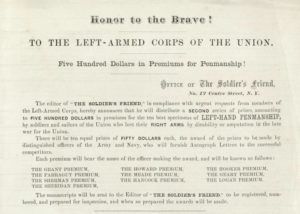
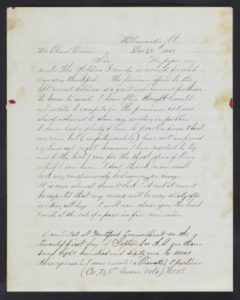
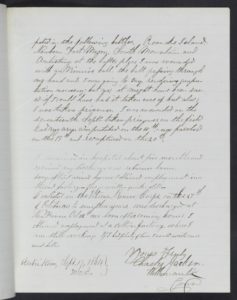
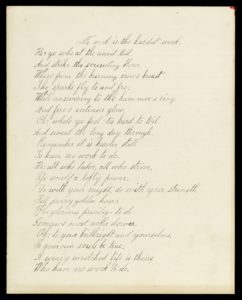

Please Leave a Reply